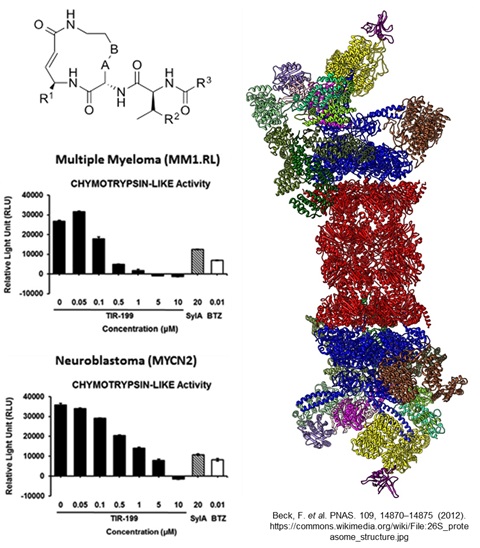Novel Proteasome Inhibitors
Background
Proteasome is the central molecular machinery responsible for the degradation of unfolded, unneeded, and unused proteins in the cell. Its involvement in a variety of physiological processes has made it an attractive target for developing drugs against a number of diseases, including cancer, autoimmune, and infectious diseases. In fact, the anti-neoplastic effect of anti-proteasome inhibitors has been the inspiration behind three FDA-approved, marketed drugs for multiple myeloma: Velcade® (bortezomib), Kyprolis® (carfilzomib), and Ninlaro® (ixazomib). Anti-proteasome drugs not only help save lives but also show excellent commercial potential.
Brief Description
This technology provides methods for synthesizing a group of naturally occurring compounds, syrbactins, and their derivatives, being of significant commercial value due to the ability of some of the members to inhibit proteasomal activity. TIR-199, for example, is one of the most potent proteasome inhibitors synthesized so far. The efficacy and efficiency of this novel drug candidate in inducing tumor cell death in multiple myeloma, neuroblastoma, and other types of cancer (e.g. kidney, colon, melanoma, ovarian) has been demonstrated using in vitro systems, cell lines, and animal models (reported for the first time for a syrbactin compound). TIR-199 drug candidate is ready for further pre-clinical and eventually clinical studies.

Patent Status
| Country | Type | Number | Dated | Case |
| United States Of America | Issued Patent | 9,399,627 | 07/26/2016 | 2012-343 |
Contact
- Grace Yee
- grace.yee@ucr.edu
- tel: View Phone Number.
Other Information
Keywords
oncology, auto-immune diseases, infectious diseases
